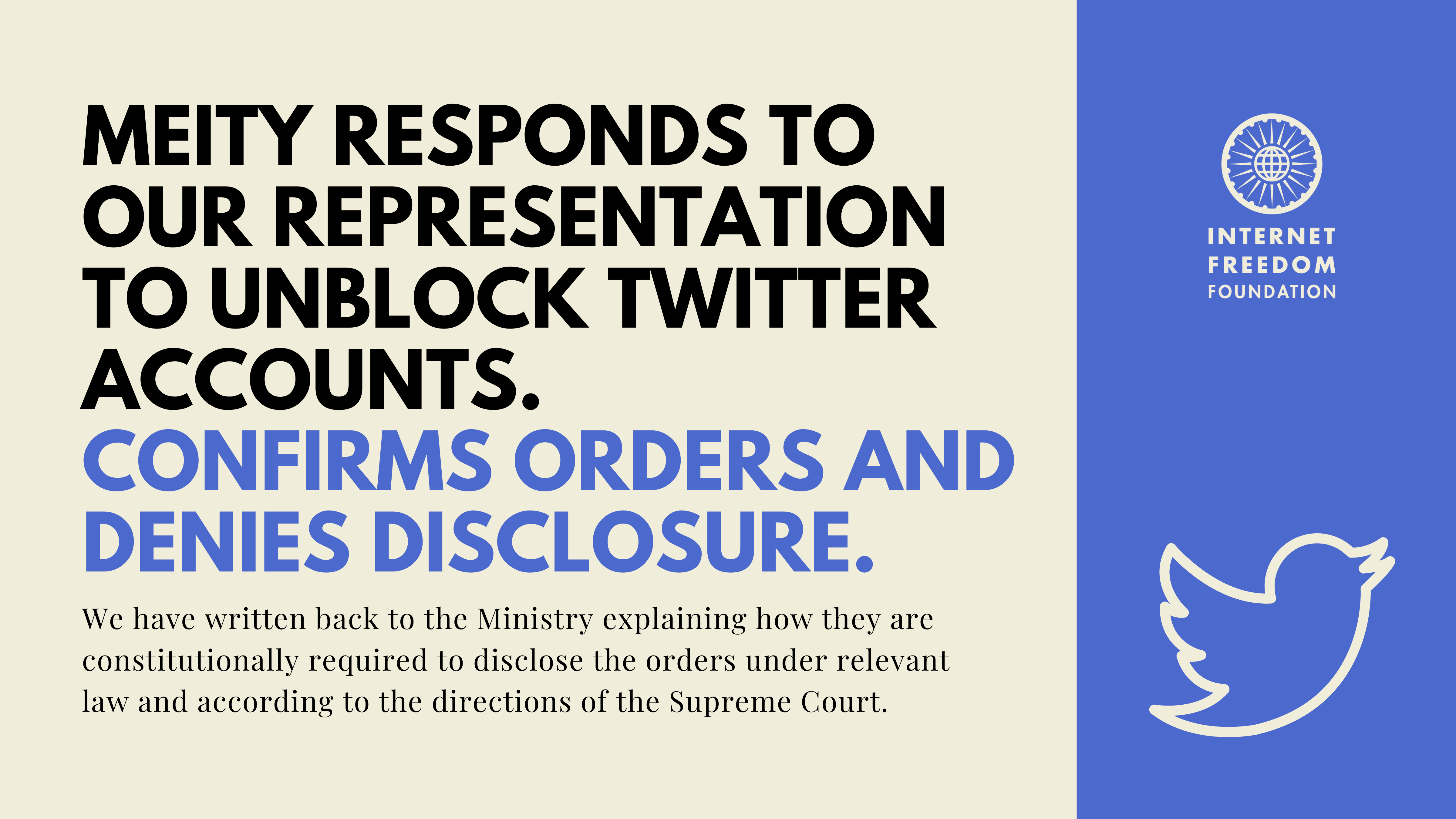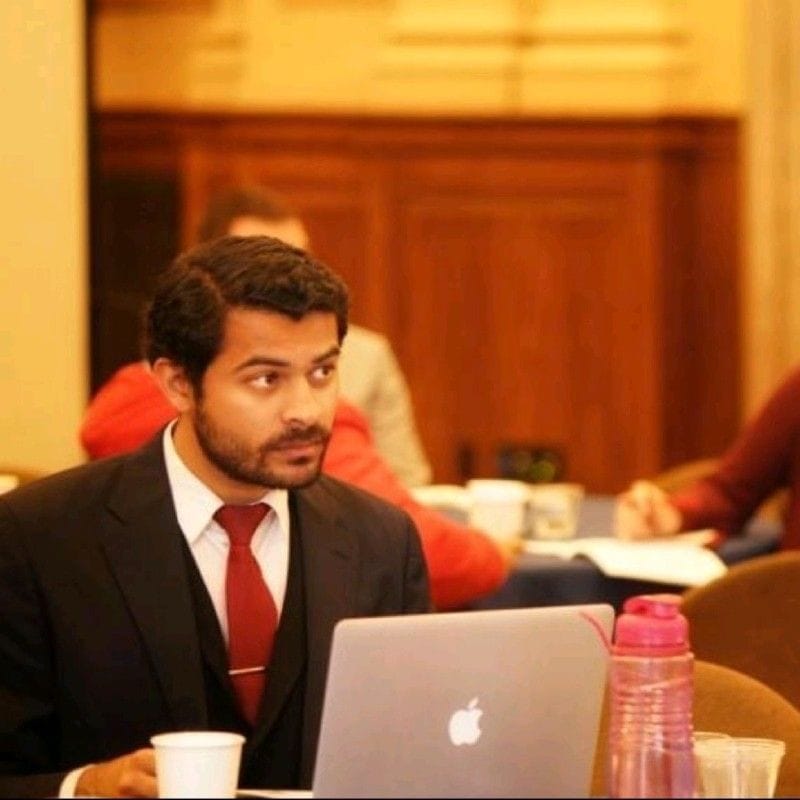
Tldr
In February, Twitter disabled nearly 250 twitter accounts belonging to news media, politicians, activists, farmers groups, etc., in the backdrop of the farmer’s protests. We immediately wrote to the Ministry of Electronics and IT (MeitY) requesting that the accounts be restored, and that the blocking orders be disclosed. MeitY responded to us on 26th April, 2021 saying that their actions were authorised by law, and that they are not required to disclose the blocking orders. We have written back to the Ministry this week explaining how they are constitutionally required to disclose the blocking orders under relevant law, and according to the directions of the Supreme Court.
Background
On the 1st of February this year, news emerged that multiple Twitter accounts had been blocked in response to a legal request from the Ministry of Electronics and Information Technology. Based on the reports, it seemed as if close to 250 accounts, belonging to a diverse group of entities such as news media organisations, politicians, activists, and farmers groups, were reported to have been blocked.
While Twitter subsequently restored the blocked accounts by the evening of 1st February after significant public outrage, concerns about secrecy, proportionality and arbitrariness have been raised. Furthermore, on February 3rd, the Ministry is reported to have sent an order to Twitter warning it about this decision.
The Ministry, pointing to Twitter’s obligations as an intermediary bound by Centre’s guidelines under section 69A of the Information Technology Act, 2000, asked Twitter to comply with the earlier order or face criminal proceedings with penal consequences of imprisonment for up to 7 years. A press note also seems to have been privately circulated amongst various media outlets that provided further details about the same and outlined both the rationale behind the initial order as well as the Centre’s stance on Twitter’s response. Kindly note that this press note was not made public and neither were the legal orders under which the blocking directions were issued.
On 8th February, fresh reports emerged of a new order having been sent by the Ministry on 4th February, sharing a list of 1,178 more accounts that it wanted removed. Twitter subsequently put out a blogpost in which they said that:
- They had undertaken a range of enforcement actions against more than 500 accounts that MeitY had escalated. Further, had taken steps to reduce the visibility of hashtags containing harmful content.
- They had withheld a portion of accounts identified in the blocking orders within India only, though these accounts would be visible outside India. No action was taken against the accounts of news media entities, journalists, activists, and politicians, as Twitter believed this would violate their fundamental right to free expression.
These events demonstrated that there was an unconstitutional and disproportionate exercise of censorship. What makes this worse, is that there was little public disclosure of the legal orders even when it impacted the fundamental right to receive information that is a part of Article 19(1)(a) of the Constitution of India.
Representation by IFF
We wrote a representation to MeitY on the 8th of February. In our letter, we pointed out that such actions are harmful not only for operational transparency but also for India’s democratic ethos. The representation focussed on the following three points:
- The secrecy and lack of a clear process of a prior notice and hearing with respect to the blocking of the accounts under Section 69A of the Information Technology Act, 2000 is constitutionally inconsistent.
- Additionally, the directions themselves, which would contain the reasons for why the accounts have been directed to be suspended, have not been made public. This directly impacts the users of the accounts with respect to their fundamental rights to freedom of speech and expression and access to judicial remedies.
- Furthermore, it is in breach of the directions of the Supreme Court in the Shreya Singhal (paras 117, 118, & 119) and Anuradha Bhasin Judgements (paras 15, 16, 17, & 18) that recognise the public’s right to receive public information and any censorship for it being as per principles of transparency and proactive disclosures.
MEITY Responds
On 26th April, 2021, MEITY emailed us their response to our letter. This response is being published in full for the sake of transparency. They have justified actions taken by them, refused to recall their orders and defended the secrecy of the legal orders issued by them. The top points which emerge from their response are set out below:
- The Ministry has followed the due process necessary under section 69A and the Blocking Rules. The former was found to be constitutionally valid in the Shreya Singhal vs Union of India judgement of the Supreme Court.
- Under Rule 16 of the Blocking Rules, all requests and complaints received and all actions taken thereof shall be confidential. Thus, the directions to block the Twitter accounts were fair and followed the course of the law. However, they cannot be made public due to the obligation of confidentiality.
Basically, as one might have expected, they said that they did nothing wrong.
Our rejoinder
Earlier this week, on May 5, we responded to MeitY urging them once again to make the available the blocking orders pursuant to which the 250 or so accounts were taken down. We pointed out that disclosing such blocking orders is necessary to bring the actions of MeitY in accordance with the requirements of the IT Act, 2000, the directions of the Supreme Court, constitutional values, and the principles of natural justice.
MeitY had claimed that it was authorised under Section 69A of the IT Act to issue the blocking orders, and relied on Shreya Singhal v. Union of India (2015) 5 SCC 1 to say that Section 69A of the IT Act had been upheld as constitutionally valid by the Supreme Court. We explained in our letter that Section 69A of the IT Act was indeed held to be constitutionally valid under Shreya Singhal, but subject certain specific safeguards. These safeguards stipulate that reasons have to be recorded in writing in such blocking order so that they may be assailed in a writ petition under Article 226 of the Constitution (paragraph 114 of Shreya Singhal). Further, according to paragraph 115 of Shreya Singhal, where the originator is identified, which in the present case is true for many blocked twitter accounts, the originator must be presented an opportunity to be heard before a blocking order is passed, under Rule 8 of the Blocking Rules. Even in instances of emergency blocking, a post-decisional hearing must be provided. We pointed out that no such opportunity was afforded to the accounts that were disabled.
MeitY also relied on Rule 16 of the Blocking Rules to claim confidentiality of the blocking orders. We pointed out that this was premised on an incorrect understanding of the Rules. The confidentiality requirement of Rule 16 pertains to the complaints received by MeitY on the basis of which it took the action, and does not mean that the blocking orders issued by MeitY are also to be kept confidential. Such a reading of Rule 16 would be unconstitutional, and would also violate the directions of the Supreme Court in Shreya Singhal (2015) 5 SCC 1 (paragraphs 112, 114, 115) and Anuradha Bhasin v. Union of India (2020) SCC 3 637 (paragraphs 23, 24, 25).
On the basis of these reasons, we urged MeitY once again to uphold constitutional values and the spirit of transparency, in this and in future cases. We will keep you updated on the Ministry’s response to us. Our belief is centered from constitutional values that transparency in any act of censorship is necessary not only for legality but for maintaining the democratic values of public trust.
Important Documents
- IFF’s rejoinder to MeitY’s dated May 05, 2021 (link)
- MeitY’s email response dated April 26, 2021 (link)
- IFF's letter dated February 8, 2021 to MeitY regarding 'Secretive and disproportionate directions issued to Twitter under Section 69A of the Information Technology Act, 2000' (link)
- Our previous post dated February 8, 2021, titled ‘Government censorship and the dire need for transparency’ (link)

